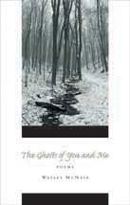The Ghosts of You and Me
DAVID R. GODINE, 2006
In his sixth collection, Wesley McNair offers his fullest vision of human life, both its hardships and its rich possibilities. Opening with poems about growing up with family conflict in a New England of broken farms and towns, McNair explores the limits of personal wishes and American dreams. Here too are haunting encounters with ghost selves, the dead, and the gangsters in old movies; lighter fare such as a poem about the poignant hopefulness of comb-overs; and a transcendent series of lyrics that celebrate self-acceptance and the spiritual dimension of "life on the ground." Praised by Maxine Kumin as "a master craftsman" and by Philip Levine as a poet with "a profound love and understanding of people and a superb ear," Wesley McNair here gives us his strongest and most moving volume to date, a major addition to what the Ruminator Review calls "one of the most individual bodies of work by a poet of his generation."
Select Praise
"Plainspoken portraits of hardscrabble Maine men and women join laconic, trustworthy meditations on middle age, old age, mourning and love in this sixth outing from the underrated McNair (Fire, 2002). The volume opens with anecdotes and memories of nearly wasted lives: disappointed farmhands, hired men, residents of "the trailer on the way/ to the dump" and refugees from the "innocent" 1950s, as in the very quotable poem that explains "how the first/ black and white TVs made their way/ to the homes of the poor, who loved them best." The second half shifts gears, offering elegies and laments for a lost self: the titular ghosts mingle easily with sympathetic living families, and even, in the likely anthology piece "The Man He Turned Into," with the poet's hopes for his own art. McNair's unornamented American speech and his insistent, blue-collar sincerity recall Philip Levine, but McNair's real precedent lies closer to his Down East home: he is the true heir of Philip Booth, whose quiet lines have long melted New England hearts and won younger poets' warm allegiance, no matter how icy the air outside."
—Publishers Weekly
"McNair's sixth collection continues his exploration of a personal New England, the view across the pond at people, ghosts, places, moments, hopes, dreams, and realities. The poet has an appreciation for cinema gangsters ("The cars they stole looked as square/ as the small-town chumps/who owned them...") and the quaint lovemaking of the old movies ("the lovers saving it for the end/ which was called The End, and all/ dressed for it, though everybody knows/ the whole idea is to take your clothes off/ as they do in films today"). He finds cause to celebrate with a "Hymn to the Comb-Over" and remembers "The Last Black and White TV." But it is not just nostalgia-McNair's poems are full of people with lives like his own, like ours, ordinary lives that are incredibly unique and complex. One poem title says it all: "As Long As We Remember Him He Will Never Die." According to McNair, "nothing in the quick/ double-knowing of the pond is ever lost." Good to know. Recommended for contemporary American poetry collections."
— Library Journal
"I wonder if Maine is half as interesting as the poetry Wesley McNair has written about the place. He finds so many skewed and irresistible characters who manage to get into odd situations for which there is only one remedy: to persevere. In this new collection he strikes me as one of the great storytellers of contemporary poetry, a poetry which has largely given up narratives, perhaps because they require people other than the poet or in addition to the poet, a challenging task for solipsists . . . Never before have I found McNair's brand of humor so subtle and affirming. Nor when he wanders from his tales can I recall him writing such perfect small lyrics about damn near anything."
— Philip Levine, Ploughshares
Select Reviews
